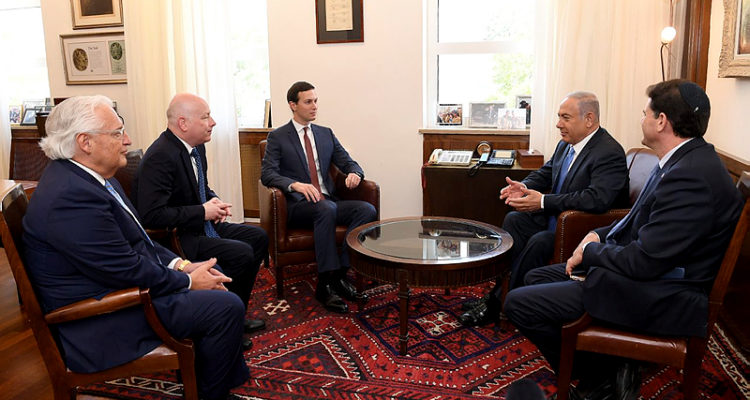A corridor linking Gaza to the PA-run area would physically connect and significantly strengthen two hostile anti-Israel regimes.
By Moshe Phillips
The Trump administration’s proposal to create a corridor linking Hamas-run Gaza to the Palestinian Authority (PA)-run territories would pose a grave danger to Israel’s security. No wonder senior Israeli officials are alarmed; American friends of Israel should be, too.
The economic part of the Trump Middle East plan is well known and was the subject of the recent conference in Bahrain. The United States and other countries will contribute $50 billion to the Palestinian Arabs. What has not yet been explained is how the corrupt, terror-sponsoring Palestinian Authority can be trusted with that money.
Will the PA suddenly stop paying salaries to terrorists? Will senior PA officials stop taking lavish salaries and kickbacks? Will democracy and clean government take hold in a region that does not have a history of embracing such systems? Those questions remain to be answered.
The political part of the Trump Plan is still largely under wraps. But one aspect of the plan was recently revealed, and Israeli officials are deeply concerned: the creation of a highway and a railway linking the Gaza Strip to those parts of Judea and Samaria that are controlled by the PA.
Such a land corridor, slicing across Israel’s strategic middle, would physically connect and thereby significantly strengthen two hostile anti-Israel regimes.
According to a report by Israel’s Channel 13 and the Axios news website this week, Israeli officials have made it clear to the Trump administration that the land corridor proposal would expressly endanger the Jewish state.
“Israel gave U.S. officials examples of how even today—with no transportation corridor and Israel in full control of the borders of the Gaza’s borders—Hamas attempts to transfer operatives, messages and know-how from [the] Gaza [Strip] to the West Bank by exploiting entry permits granted for humanitarian reasons,” the report stated.
If Hamas is already taking advantage of every current opportunity they have to send terrorists from Gaza to Judea-Samaria, just imagine what it would do if it is given a highway and railway across which it could transport whatever and whoever it wants.
And if Israel tried to interfere with Palestinian Arabs using that corridor, it would become the subject of severe international condemnation. The United Nations would probably threaten sanctions. Jewish “peace” groups would mobilize members of Congress to denounce Israel for “restricting the Palestinians.” It would turn into a nightmare of criticism and pressure and would effectively tie Israel’s hands.
Greenblatt ‘surprised’ by Israel’s concerns
Trump administration envoy Jason Greenblatt told Axios that he is “surprised” by Israel’s opposition to the corridor proposal because the U.S. has repeatedly promised that “Israel’s security is first and foremost.”
Maybe the Israelis are more interested in the merits of the actual U.S. proposal than vague promises by U.S. officials that can change depending on U.S. election outcomes.
If Hamas starts sending camouflaged truckloads of missiles across the transportation corridor, will U.S. inspectors be on hand to intervene? Would the war-weary American public accept the stationing of U.S. soldiers in such a dangerous position?
Greenblatt said he is “not aware” of “any official push-back from the Israeli government” concerning the corridor plan. The key word here is “official.” Israel’s leaders handle their relationship with the United States extremely carefully, as they should. Of course they are reluctant to issue any “official” or public criticism of an administration that generally has been extremely friendly.
But it’s not fair for Greenblatt to use Israel’s caution and good diplomatic manners against it. Greenblatt knows that the Israelis are not going to rush to start denouncing this administration’s plans. The fact that there has been no “official push-back” from Israel regarding the corridor should not be taken as a sign that Israel is comfortable with the proposal. As this week’s news report demonstrates, the Israelis see the corridor as a serious danger.
American friends of Israel must take heed. If they remain silent, this transportation corridor proposal may move forward. Now is the time to speak out against it; later may be too late.
Moshe Phillips is national director of Herut North America’s U.S. division.





